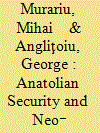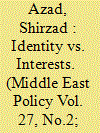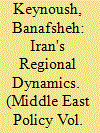|
|
|
Sort Order |
|
|
|
Items / Page
|
|
|
|
|
|
|
| Srl | Item |
| 1 |
ID:
174665


|
|
|
|
|
| Summary/Abstract |
On the morning of August 24, 2016, units of the Turkish armed forces, along with allied groups such as the Free Syrian Army, crossed the border into northern Syria. Their target was a region still dominated by the presence of the weakened and declining Islamic State, yet their ultimate purpose was to block the increase of Kurdish power in the region. Just over a month after an armed coup attempt and exactly five centuries after the battle of Marj Dabiq, which once brought about Ottoman hegemony over Syria and Egypt, the military operation was to represent the beginning of Turkey's direct involvement southward and, arguably, a stepping stone toward dominance in northern Syria. Turkey's increased presence in Syria and its attempt to expand its reach throughout the Middle East and the wider Muslim world can be considered a forward defense of its Anatolian heartland. After all, it is the geography of Anatolia that enables Turkey to project its power into the Marmara straits, the Black Sea, the Aegean Sea and the Eastern Mediterranean, while simultaneously placing the state in proximity to the Caucasus and even within striking distance of the Persian Gulf. Accordingly, Anatolia is also vulnerable to attack from many sides, despite complex relations with historical enemies such as Russia and Greece, leading to the existence of elements of the security community.
|
|
|
|
|
|
|
|
|
|
|
|
|
|
|
|
| 2 |
ID:
174659


|
|
|
|
|
| Summary/Abstract |
The Arab Spring of 2011, as many analysts termed it, led to renewed interest in democratization studies. The popular protests toppled governments and forced long‐entrenched autocrats out of office in Tunisia, Egypt, Libya and Yemen. The uprisings caught many political analysts by surprise, as the Middle East and North Africa (MENA) region was long considered resistant to democratic change, an exception in terms of democratic transitions. Nine years in retrospect, the initial euphoria surrounding the potential for democratic governance in the MENA has faded away as autocratic governments regained power and cracked down on civil liberties. Worse still, the region is plagued by political chaos, instability, civil wars and violence perpetrated by various state and nonstate actors. Today, with the exception of Tunisia, the Arab Spring has given way to a longstanding Arab winter.
|
|
|
|
|
|
|
|
|
|
|
|
|
|
|
|
| 3 |
ID:
174663


|
|
|
|
|
| Summary/Abstract |
Oil and gas resources and their transit routes are key sources of international power and tools of foreign policy, used not only to develop relations with other countries but to maintain regional peace and stability. However, the United States seeks to weaken energy‐rich countries through sanctions to achieve economic and political goals. Hence, the need has arisen to establish competitive plans to secure energy supplies and provide security to industrialized importers during oil shocks. The main goal is to ensure a sustainable energy supply for industrialized nations and regulate international affairs.
|
|
|
|
|
|
|
|
|
|
|
|
|
|
|
|
| 4 |
ID:
174664


|
|
|
|
|
| Summary/Abstract |
Since the ascendancy of the Justice and Development Party (AKP) in 2002, Turkey has critically reappraised its foreign‐policy priorities. Led by President Recep Tayyip Erdoğan, the Turkish political establishment has reset its conventional pattern of foreign‐policy behavior by distancing the country from the West in favor of better connections to other regions. Turkey has not abandoned its long‐cherished aspiration of European Union (EU) membership, but its top leadership has demonstrated that the Turks are no longer willing to pay any demeaning cost in order to achieve that erstwhile goal. Moreover, Turkish leaders have sometimes even gone out of their way to criticize certain Western politico‐economic as well as cultural policies, no matter that their country is still an active member of the North Atlantic Treaty Organization (NATO).
|
|
|
|
|
|
|
|
|
|
|
|
|
|
|
|
| 5 |
ID:
174666


|
|
|
| 6 |
ID:
174662


|
|
|
|
|
| Summary/Abstract |
Regional conflicts and interstate tensions squander potentially abundant partnerships that could be built between Iran and its neighbors in the Near East. Tehran's expansionist foreign‐policy agenda in the region means that its bilateral ties often address immediate conflicts or selectively driven interests. Regional states that are codependent for their security on the United States or collectively among themselves, including members of the Gulf Cooperation Council (GCC), are less successful in retaining strong bonds with Iran. States capable of developing independent foreign policies, such as Turkey and Israel, condition engagement with Iran on its ability to accommodate their interests. Tehran enjoys influence in countries plagued by conflicts, such as Syria, Lebanon and Iraq, by pursuing high‐risk and costly policies. As a result, a piecemeal approach to addressing immediate needs and threats is the main connection that the regional states have with Tehran.
|
|
|
|
|
|
|
|
|
|
|
|
|
|
|
|
| 7 |
ID:
174658


|
|
|
|
|
| Summary/Abstract |
On April 4, 2019, General Khalifa Haftar, commander of the Libyan National Army (LNA) and the strongman of the Al Bayda government, a Libyan faction associated with the “Tobruk Parliament,” launched an assault on the capital, Tripoli, in a final bid to conquer the country. Indeed, Libya has been divided since 2014 between the government of Tripoli, called the Government of National Accord (GNA), formed under UN mediation in December 2015, and the Al Bayda government, which emanates from the Tobruk parliament. Beyond a rivalry between the two groups, this represents a conflict between regional and international powers, each backing one of the warring parties.
|
|
|
|
|
|
|
|
|
|
|
|
|
|
|
|
| 8 |
ID:
174657


|
|
|
| 9 |
ID:
174667


|
|
|
|
|
| Summary/Abstract |
The extension of academic censorship on Palestine to the medical world is, despite its pervasiveness, relatively unknown. In the latest iteration, a letter highlighting the Gaza Strip's vulnerability to the Covid‐19 pandemic was removed from The Lancet's website after a swift pressure campaign. While the immediate effects were minimal — despite its short shelf‐life, the piece is among the top 5% most discussed research publications1 — the chilling effect of such campaigns on writers and editors is profound and enduring. This commentary outlines the struggle to make space for discussion and academic inquiry into the health impacts of the ongoing suffering inflicted on the Palestinian people.
|
|
|
|
|
|
|
|
|
|
|
|
|
|
|
|
| 10 |
ID:
174660


|
|
|
|
|
| Summary/Abstract |
Africa has experienced an unprecedented level of involvement in its regional affairs by Middle Eastern states in the past few years.1 This is a remarkable development, indeed, given that transregional relations have been characterized by reciprocal ignorance for most of the post‐World War II period.
|
|
|
|
|
|
|
|
|
|
|
|
|
|
|
|
| 11 |
ID:
174661


|
|
|
|
|
| Summary/Abstract |
What appears to be Russia's recent series of successes in the Middle East has been considered by many commentators as a sign of its rising power in one of the world's key regions. Indeed, alongside Iran, Russia has helped its key ally, the Bashar al‐Assad regime, which had been at the brink of collapse in 2015, to regain control over much of Syria. Moscow has also provided support to General Khalifa Haftar to make significant advances against his opponents in the Libyan civil war. This article questions these widespread assumptions. It makes the point that these successes have been rather minor and are likely to be short‐lived in the face of the challenges both Arab republics face. In spite of tactical gains, Moscow has trapped itself in the messy politics of civil‐war‐torn nations with a host of economic, political and social problems. Should Moscow benefit from its presence in these nations, it has to engage substantially in the costly postwar reconstruction, international support and — particularly in the case of Syria — convoluted entanglement of the often‐contradictory interests of regional powers. This article claims that, while Russia has little to gain from engagement in these challenging tasks, it is likely to be dragged into them.
|
|
|
|
|
|
|
|
|
|
|
|
|
|
|
|
|
|
|
|
|